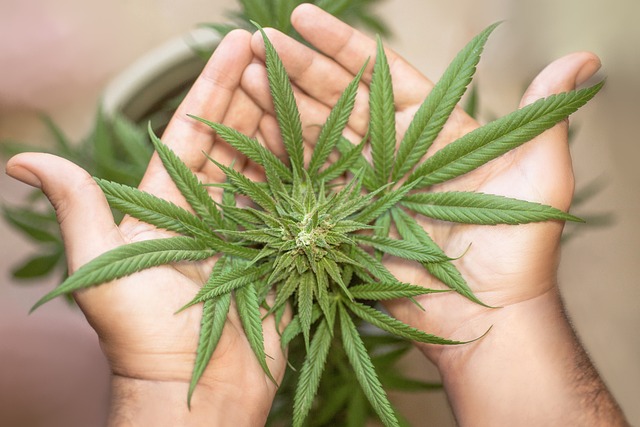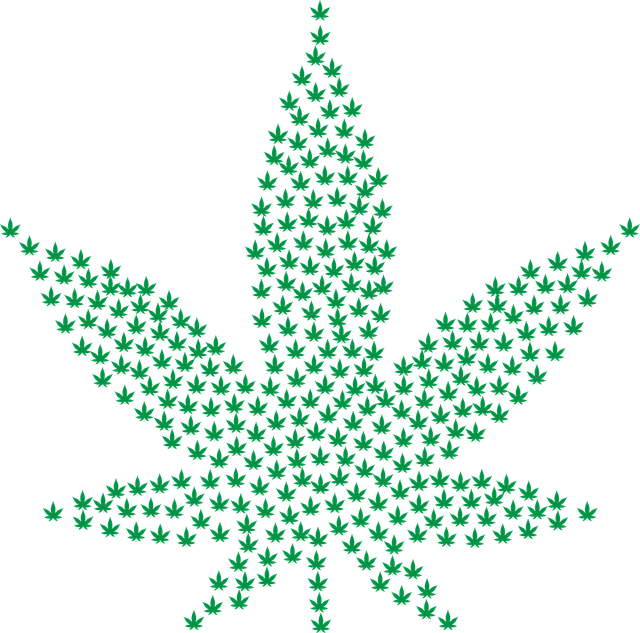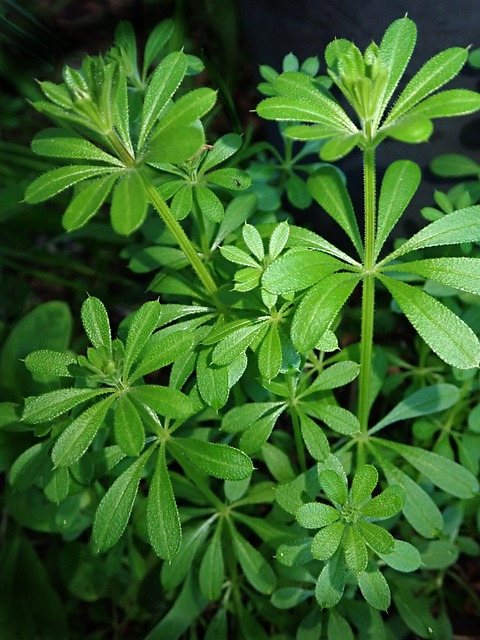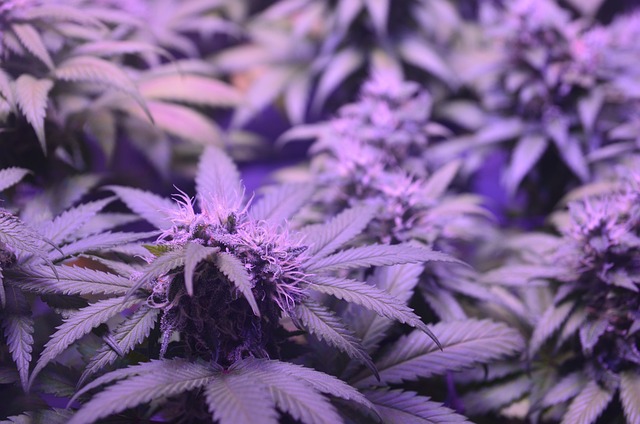2018 Farm Bill provisions have made THCA, a non-psychoactive cannabinoid found in hemp and cannabis, legally distinct from its psychoactive counterpart, Delta-9-THC, in states like Florida. With Florida's Hemp and CBD Act of 2019 aligning with federal regulations, THCA products are legal as long as they contain less than 0.3% Delta-9-THC by dry weight. This legal clarification has led to an increased availability of THCA flower in the state, where it's recognized for its therapeutic potential, including anti-inflammatory, neuroprotective, and antiemetic properties. The legality of THCA in Florida hinges on its hemp origin and THC content, differentiating it from the state's recreational or medical marijuana laws. As interest in THCA grows, there's a call for more research to further understand its effects and guide consumers and policymakers within the evolving landscape of cannabinoid science, particularly highlighting THCA's legal status in Florida.
exploration into the burgeoning landscape of cannabinoids brings us to THCA flower, a subject garnering considerable attention amidst evolving legal frameworks. As this phytochemical gains traction for its potential therapeutic properties, understanding its distinct chemistry compared to its psychoactive counterpart, THC, becomes paramount. This article delves into the nuances of THCA’s legal status in Florida and its side effects, informed by the latest scientific research and consumer accounts. From the entourage effect’s role in cannabinoid interactions to dosage recommendations within legal confines, we aim to provide a well-rounded perspective on this emerging wellness trend. The implications of THCA flower’s legality, safety measures through testing and regulation, and its integration into daily health practices are also under the microscope. Join us as we navigate the intricacies of THCA’s presence in Florida, ensuring informed use and insightful awareness for those considering its addition to their wellness routine.
- THCA Flower: An Overview of Its Rise in Popularity Amidst Legal Changes
- Understanding THCA: What It Is and How It Differs from THC
- THCA Legal Status in Florida: A Closer Look at the Law
THCA Flower: An Overview of Its Rise in Popularity Amidst Legal Changes

The THCA flower, rich in tetrahydrocannabinolic acid, a non-psychoactive cannabinoid found in the Cannabis sativa plant, has seen a significant rise in popularity, particularly in regions where legal reforms have opened new avenues for its use. In Florida, a state that has embraced more lenient laws regarding cannabis products, THCA flower has gained attention for its potential therapeutic properties and as an alternative to other cannabinoid forms like THC. The legal status of THCA in Florida hinges on the specific forms of hemp-derived products, with the 2018 Farm Bill paving the way for such derivatives to be legally sold provided they contain less than 0.3% delta-9-THC. This legislative shift has led to an influx of THCA flower products in the market, catering to a wide range of consumers seeking wellness benefits without psychoactive effects. As awareness grows and legal frameworks continue to evolve, THCA flower is becoming a staple in the wellness routines of many Floridians, highlighting its versatility and potential applications across various health and well-being domains.
Understanding THCA: What It Is and How It Differs from THC

Throughout recent years, interest in cannabinoids has grown exponentially, with THCA—tetrahydrocannabinolic acid—gaining attention for its unique properties and potential health benefits. Unlike its well-known isomer THC—tetrahydrocannabinol—THCA remains non-psychoactive until it undergoes decarboxylation, a process that occurs when heated, converting THCA into THC. This distinction is significant for those curious about the legal landscape of cannabis derivatives. For instance, THCA flower, which contains the acidic form of THC, is considered legal in Florida under specific conditions, as per the state’s hemp laws. These regulations differentiate between THC and its precursor THCA, allowing for a range of products that offer the therapeutic potential of cannabinoids without crossing the legal threshold for psychoactive substances.
The distinction between THCA and THC extends beyond their legal status to their effects on the body. Research suggests that THCA may possess anti-inflammatory, neuroprotective, and antiemetic properties, which could be beneficial in treating a variety of conditions from inflammation to nausea. The interest in THCA flower side effects stems from its potential health applications and the desire to understand its safety profile thoroughly. While some side effects have been reported anecdotally, such as mild psychoactive effects when exposed to high temperatures, more research is needed to fully elucidate its impact on human health. As such, the exploration of THCA’s legal status in states like Florida, where it aligns with current legislation, offers a window into the evolving understanding of cannabinoids and their potential role in medicine and wellness. Understanding the nuances between THCA and THC is crucial for consumers, manufacturers, and policymakers navigating this rapidly changing field.
THCA Legal Status in Florida: A Closer Look at the Law

Delta-9-tetrahydrocannabinolic acid (THCA) is a non-psychoactive cannabinoid found in hemp and cannabis plants, which has garnered attention for its potential therapeutic properties. As of the knowledge cutoff in 2023, the legal status of THCA in Florida is distinct from that of its psychoactive counterpart, Delta-9-THC. The 2018 Farm Bill legally defined hemp as any cannabis plant containing less than 0.3% Delta-9-THC by dry weight, thus making all other cannabinoids, including THCA, federally legal. However, Florida’s state laws have their own set of regulations that align with the federal stance.
In Florida, the passage of the Hemp and CBD Act in 2019 explicitly made hemp and derivatives containing less than 0.3% Delta-9-THC legal. This includes THCA, provided it is derived from hemp and contains no more than the trace amounts of Delta-9-THC permitted by state law. It’s important to note that while THCA flower may be legally available in Florida under these conditions, its use and possession are subject to the state’s regulations and restrictions. Users must navigate these laws carefully, as they differ from those governing recreational or medical marijuana, which contain higher levels of Delta-9-THC and are subject to a separate set of regulations under Florida’s medical marijuana legalization initiated by Amendment 2 in 2016. Understanding the distinctions between THCA and Delta-9-THC is crucial for consumers and businesses operating within Florida’s evolving cannabis landscape.
In recent times, THCA flower has gained significant attention within the wellness and recreational communities, particularly as its legal status continues to evolve. This article has delved into the rise of THCA’s popularity, distinguishing it from its psychoactive counterpart, THC, and providing a clear understanding of its current legal standing in Florida, especially with the enactment of laws that regulate its use. It is clear that THCA’s potential benefits and its distinctly different effects from THC have piqued public interest. As THCA continues to carve out its niche within legal frameworks, discerning consumers and medical patients are encouraged to stay informed about the evolving regulations surrounding this unique compound. For those interested in exploring THCA legal options in Florida, it is crucial to adhere to state laws and guidelines to ensure compliance with current legislation.
